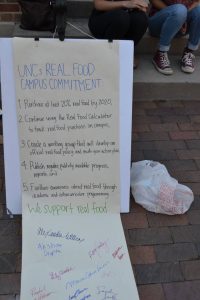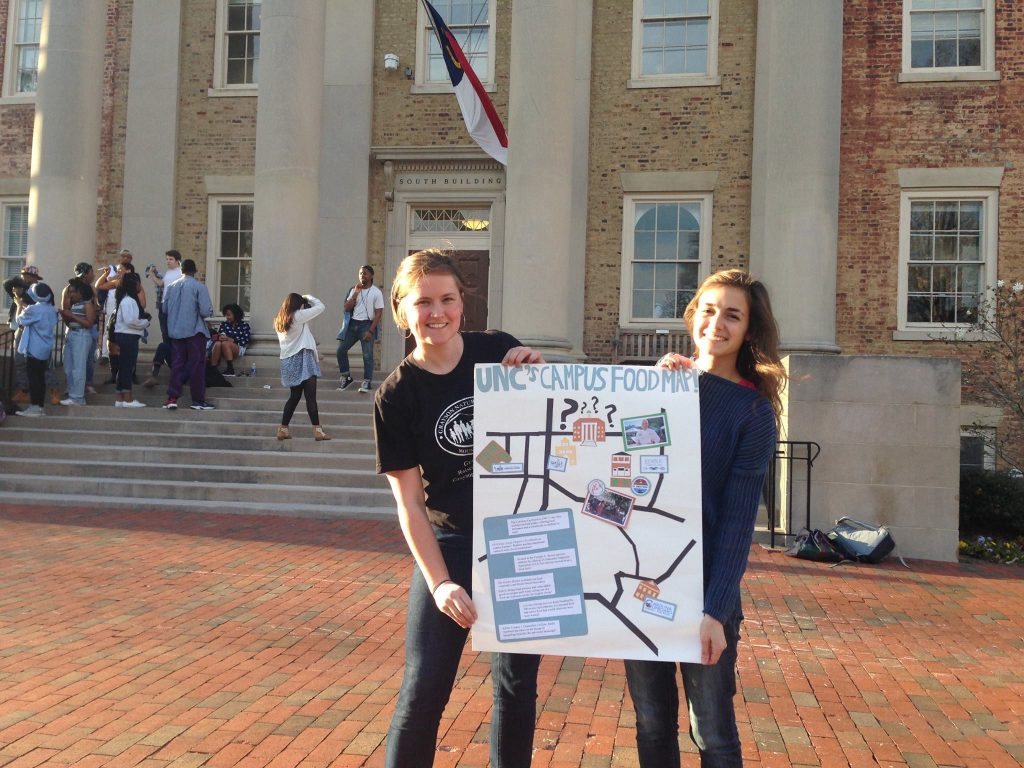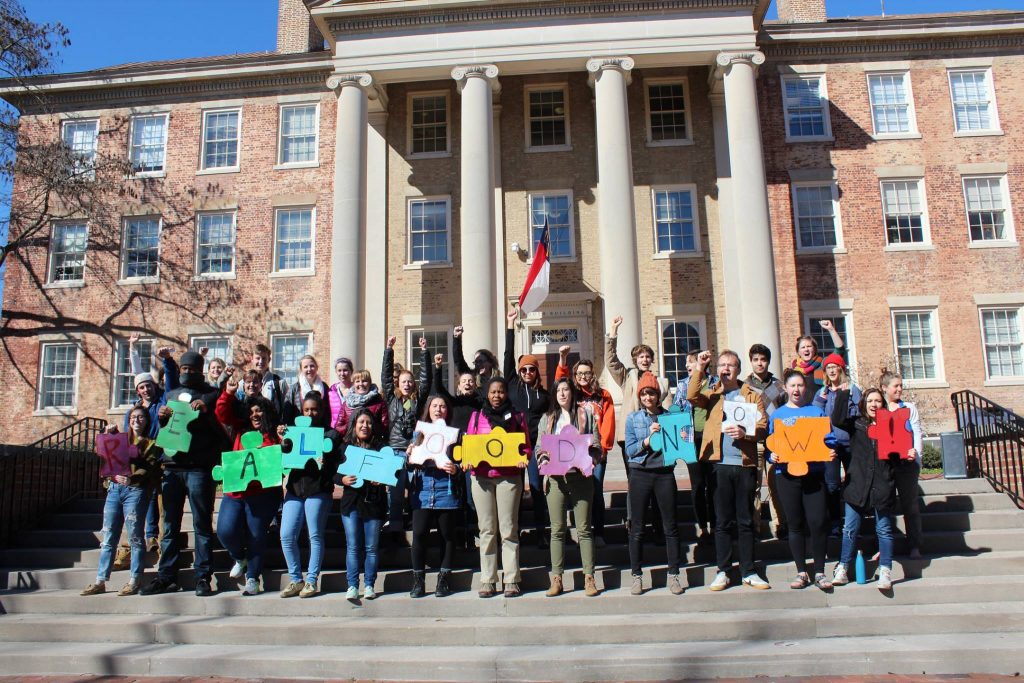Alexandra Willcox
Collegiate Champion for Real Food
 TITLE: A leader of the UNC Real Food Challenge
TITLE: A leader of the UNC Real Food Challenge
LOCATION: Chapel Hill, North Carolina
IMPACT: Campus commitment to source 20% of food from local, sustainable sources by 2020. Expanding student culture and awareness around food and farmers.
Alexandra Willcox is a senior at the University of North Carolina (UNC) at Chapel Hill, where she majors in environmental health sciences and French. When she’s not digging into her textbooks, she spends her time getting local food into the University dining hall.
A Chapel Hill native, Alexandra’s interest in food was sparked late in high school by documentary films and her parents’ emerging interest in local food. She started volunteering for a local hunger relief organization and brought her passion for a variety of food system issues into college. She has served as the manager for the campus farmers’ market, which hosts local farmers and vendors to sell their goods and connect with students. Working with the Real Food Challenge, she’s also been a driving force behind UNC’s signing of the Real Food Campus Commitment, which pledges the university to purchase 20% of its food from sources of what they call “real food” – defined as fair, local, ecologically sound and humane products.
“Understanding the whole cycle of production and how the food got to your plate is important – no matter where it came from.” – Alexandra Willcox
Her efforts have met their fair share of challenges. Food sourcing at most universities is bound by long-term contracts that are difficult to change. UNC is under contract with Aramark, one of the country’s largest institutional food suppliers. Alexandra admits, “We’ve had a lot more success than other Aramark schools, but there’s only so much you can do within the bounds of the contract.” One challenge is scale. UNC-Chapel Hill has nearly 30,000 mouths to feed and many local farmers cannot meet that demand. “For the most part,” Alexandra shares, “smaller farms are not a good fit for our dining hall because they don’t have the capacity to provide product at volume for a reasonable price.” However, they’ve made inroads with a few North Carolina beef producers and now source their coffee from Larry’s Coffee a sustainable coffee roaster based in Raleigh.
Increasingly, Alexandra and others are bringing new programs to the campus to educate fellow students about where their food comes from, the sourcing changes they’ve implemented, and how students can make a difference. “We have something called Themed Meals once a month, where we highlight some aspect of sustainable food” in the dining halls. Sometimes they’ll invite a local farmer, which is wildly popular among students.
Farm field trips are also key to the engagement side of her efforts. Twice a year, a group of students travel to a local farm a half hour from campus. Students try their hand at farm work and camp overnight among the squash and kale. “This experience makes people stop and think about the type of production happening right outside of Chapel Hill.” Alexandra says she’s seen many students have a sustainable food a-ha moment “just by walking a few miles down the road.”
These efforts are having powerful ripple effects. UNC-Chapel Hill has established Food for All as the university-wide research theme for 2015-2017. UNC-Chapel Hill dining services, meanwhile, is proud of its sourcing achievements and works to highlight it on their menu. Alexandra takes pride in her role in these shifts. In the spring, she will don a cap and gown and receive her diploma from UNC. While her career path may take her in a different direction, she says,“I’m always going to stay involved with the food movement – especially the local food movement – wherever I live.”

Alexandra’s advice for students looking to transform campus food:
Seek Support
- Work with Real Food Challenge. Alexandra shares, “They are good at checking in with the schools, tracking progress, and providing advice. I talk with someone from the RFC at least once every two weeks.”
- Use the Real Food Calculator, to track your institution’s dining purchases over time and follow your progress.
Negotiating
- Be willing to compromise with the school administration. As Alexandra puts it, “We all really have similar interests at the end of the day, it’s just that we have different ways of going about getting there.”
- Remember that change takes time – be patient and persistent. “Be careful when you’re aggressive and demanding,” Alexandra advises, lest you scare away the administration from committing to valuable changes.
Build A Food culture on campus
- Get involved with existing groups on campus or start your own. UNC-Chapel Hill now has a group called FLO (Fair, Local, Organic) Food, a student-run organization committed to educating students about food systems and building a better food economy on campus, as well as a robust list of other student groups engaged in composting, food recovery for local shelters, health promotion, and more.
- Make sure there’s a younger generation of students behind you committed to changing food sourcing for a sense of continuity and continuous pressure on the university.
- In 2010, UNC-Chapel Hill started its Carolina Campus Community Garden, dedicated to providing lower-wage UNC workers with access to fresh, sustainably grown produce and to serve as a learning community for developing gardening skills, healthy living, social responsibility, and interdisciplinary academic pursuits. It is a great place for students interested in food systems to volunteer.
![]()
Resources for Students
Real Food Challenge
Resources for college students who want to bring real food to their campuses.
Click here to see a complete list of Farm to School resources.






